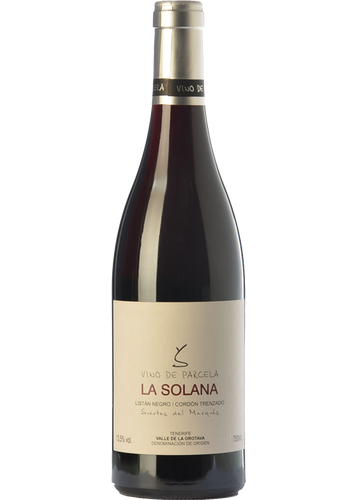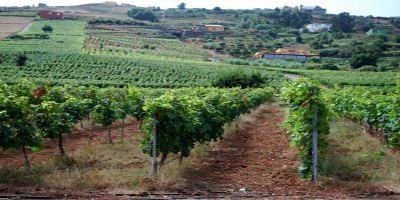How many Canary wines have you had the chance to try? Their distinct personality always comes as a surprise, doesn’t it? - with that volcanic minerality, those smoky notes… La Solana will bring itself to your notice, moreover, due to its variable personality, as you’ll discover. Made exclusively from Listán Negro, a variety native to the Canary islands, especially to Tenerife with its emblematic Teide, this is certainly a smoky wine. However, the volcanic character seems to come and go, never failing to amaze us and keeping us constantly ready and waiting.
Regarding the colour, it is fairly typical: an attractive Picota cherry red, with a crimson edge, thick tears and of medium depth, while on the nose it also fits our description of “Canary” in origin, yet there is something in its fruit expression, some humus notes, the ones we notice when we go for an autumn walk through a wood after days of rain, which brings to mind some of the Burgundy Pinot Noirs. Accompanying those woodland undergrowth aromas are some drier notes of dust and tobacco, and sweet ones, of liquorice and fruit gums. With time in the glass, the fruit-driven character begins to make its presence felt, revealing a mixture of red and black fruit, which will dominate completely once in the mouth.
If the smoky element is predominant on the nose, generous in its sensations and inviting us to come back for more, its fruitiness is particularly intense on the palate. It has a lovely, juicy entry and is medium-bodied and easily-drinkable. Yet again, with the aftertaste, the smoky notes and hints of animal leather reappear, leaving a warm finish.
Interesting, arresting, captivating. One of those wines that proves a good accompaniment to cold winters and autumnal dishes in particular. The warm heat of the Canary Islands in a refreshing, juicy wine.
(La Solana is made from Listán Negro grapes originating from a vineyard of 2.5 hectares with a north-east orientation and situated at an altitude of between 400 and 520 metres above sea level. The vines range in age from 80 to 110 years old and are grown using the beneficial ‘cordón múltiple’ system. The soil is composed of a poor layer, lying on volcanic rock. The must undergoes alcoholic fermentation in new French oak barrels with a 500-litre capacity, malolactic fermentation takes place in the same barrels, and ageing lasts for a period that varies according to the vintage, around 10-12 months.)

















